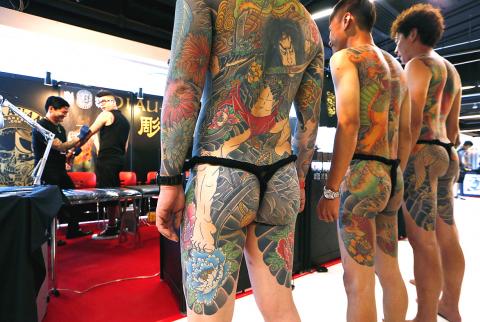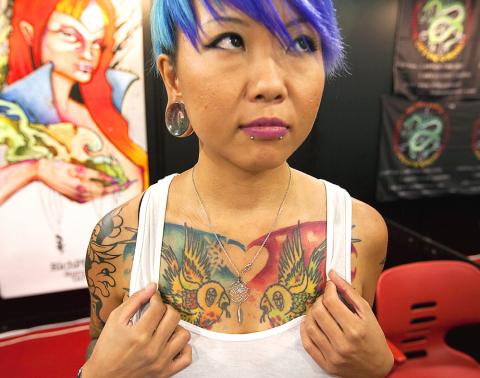Visitors flocked Friday to a Hong Kong tattoo convention, the first to be held in the southern Chinese city where tattoos were once seen as a sign of triad gang membership.
The show features more than 30 artists from countries ranging from South Africa to mainland China.
It aims to challenge “that old-fashioned notion that it’s just gangsters and sailors” who get tattoed, co-organizer Jay Foss Cole told AFP.

Photo: EPA
Hong Kong’s lawyers, doctors and university professors all sport the skin designs, said Foss Cole, also known as Jay FC, and they also appeal to people in creative industries.
Visitors, many of whom wore revealing clothing to display their own prized body sketches, browsed through designs, chose new ones and checked out different marking pens and techniques.
Spectators were awestruck by the sight of four near-nude male models showcasing their colorful full-body tattoos in Japanese style.

Photo: EPA
“I got mine because I love it,” said one of the models.
The work took 12 hours.
Others sprawled on the beds or chairs of tattoo artists and watched intently as intricate designs were inked onto their skin.
Historically tattoos on younger Chinese have largely been the preserve of triad gangsters, but the designs have begun to gain popularity among the mainstream community in recent years.
“Young people are changing their minds, not like before when they thought only mafia members wore them. Now it’s more like art,” Beijing-based tattoo artist Qi Xulong, known as “Little Dragon,” told AFP.
“Long time ago, Chinese people in Beijing and Shanghai, they don’t think that tattoos are good,” Qi said, adding that now people increasingly use tattoos to express their identities.
Foss Cole said Hong Kong’s tattoo culture is improving. “There’s more artists, there’s better artists, there’s more style, and there’s never been anything like this,” he said of the show.
The convention, said Foss Cole, shows that Hong Kong “has arrived as a world-class destination for tattoos and tattoo artists.”

The Taipei Times last week reported that the rising share of seniors in the population is reshaping the nation’s housing markets. According to data from the Ministry of the Interior, about 850,000 residences were occupied by elderly people in the first quarter, including 655,000 that housed only one resident. H&B Realty chief researcher Jessica Hsu (徐佳馨), quoted in the article, said that there is rising demand for elderly-friendly housing, including units with elevators, barrier-free layouts and proximity to healthcare services. Hsu and others cited in the article highlighted the changing family residential dynamics, as children no longer live with parents,

Oct 20 to Oct 26 After a day of fighting, the Japanese Army’s Second Division was resting when a curious delegation of two Scotsmen and 19 Taiwanese approached their camp. It was Oct. 20, 1895, and the troops had reached Taiye Village (太爺庄) in today’s Hunei District (湖內), Kaohsiung, just 10km away from their final target of Tainan. Led by Presbyterian missionaries Thomas Barclay and Duncan Ferguson, the group informed the Japanese that resistance leader Liu Yung-fu (劉永福) had fled to China the previous night, leaving his Black Flag Army fighters behind and the city in chaos. On behalf of the

I was 10 when I read an article in the local paper about the Air Guitar World Championships, which take place every year in my home town of Oulu, Finland. My parents had helped out at the very first contest back in 1996 — my mum gave out fliers, my dad sorted the music. Since then, national championships have been held all across the world, with the winners assembling in Oulu every summer. At the time, I asked my parents if I could compete. At first they were hesitant; the event was in a bar, and there would be a lot

The election of Cheng Li-wun (鄭麗文) as chair of the Chinese Nationalist Party (KMT) marked a triumphant return of pride in the “Chinese” in the party name. Cheng wants Taiwanese to be proud to call themselves Chinese again. The unambiguous winner was a return to the KMT ideology that formed in the early 2000s under then chairman Lien Chan (連戰) and president Ma Ying-jeou (馬英九) put into practice as far as he could, until ultimately thwarted by hundreds of thousands of protestors thronging the streets in what became known as the Sunflower movement in 2014. Cheng is an unambiguous Chinese ethnonationalist,